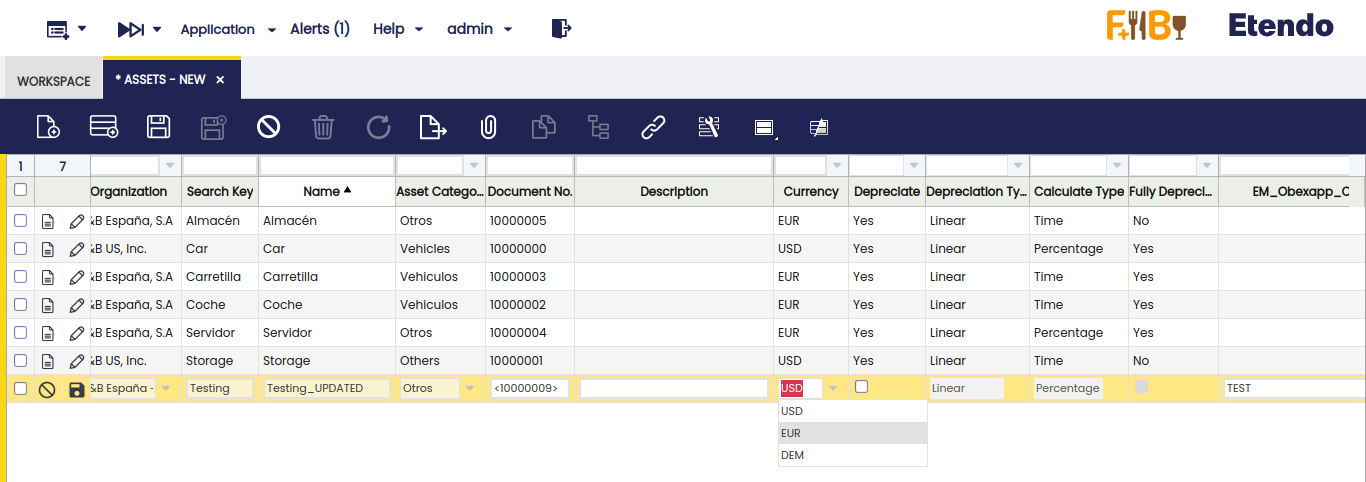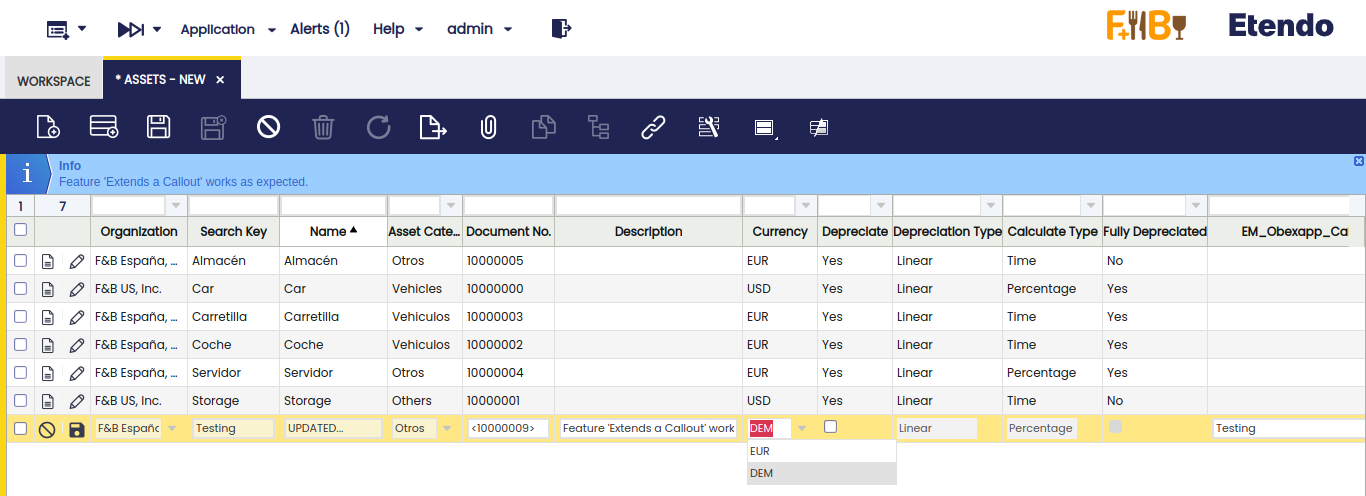How to Create a Callout that Extends from Another Callout
Overview
This section discusses how to implement a callout that extends from another callout. The main important elements needed for the new feature are explained. More details about callouts can be found in How to create a Callout.
Example Module
This section is supported by an example module which shows examples of the code shown and discussed.
The code of the example module can be downloaded from this public GitHub repository: com.etendoerp.client.application.examples.
Defining Callouts
Two callouts will be shown. One of them is the parent callout and the other one is the child callout. In this example, these two callouts are working in Assets window.
Defining Parent Callout
The following example follows this guide to implement the callout. The example shows a callout that edits value of the Name field.
package com.etendoerp.client.application.examples.callouts;
import javax.servlet.ServletException;
import org.openbravo.erpCommon.ad_callouts.SimpleCallout;
public class OBEXAPP_Assets_Name extends SimpleCallout {
protected static final String MODIFIED_FIELD = "_UPDATED";
@Override
protected void execute(CalloutInfo info) throws ServletException {
// get value of field name and update value
final String name = info.getStringParameter("inpname");
info.addResult("inpname", name + MODIFIED_FIELD);
// Combo example. Added three currencies to currency combo.
info.addSelect("inpcCurrencyId");
// USD currency is selected.
info.addSelectResult("100", "USD", true);
info.addSelectResult("102", "EUR", false);
info.addSelectResult("103", "DEM", false);
info.endSelect();
}
}
As you can see, the callout gets the value of Name field and concatenates the following string: _UPDATED. Besides you can see a code that defines a combo. This code will be explained in the following section.
Defining Child Callout
This example callout extends from the parent callout that is defined above. Combo example is explained in next section.
package com.etendoerp.client.application.examples.callouts;
import javax.servlet.ServletException;
public class OBEXAPP_Assets_Desc extends OBEXAPP_Assets_Name {
@Override
protected void execute(CalloutInfo info) throws ServletException {
// OBEXAPP_Assets_Name callout is executed
super.execute(info);
// Combo example. Removed USD currency from combo and select DEM currency.
info.addSelect("inpcCurrencyId");
info.removeSelectResult("100");
info.addSelectResult("103", "DEM", true);
info.endSelect();
// Checks if name field has been updated by parent callout.
String name = info.getStringParameter("inpname");
String message = "Feature 'Extends a Callout' works as expected.";
if (name.endsWith(MODIFIED_FIELD)) {
info.addResult("inpdescription", message);
info.addResult("MESSAGE", message);
} else {
message = "Feature 'Extends a Callout' not works as expected.";
info.addResult("inpdescription", message);
info.addResult("ERROR", message);
}
// Now it is possible to update the 'name' field again and the value will be overwritten
info.addResult("inpname", "UPDATED...");
}
}
First of all, OBEXAPP_Assets_Desc callout extends from OBEXAPP_Assets_Name. In this situation, you should take into account the following sections in this callout:
- Run parent callout.
- Operations for combo field are executed. This code is explained in the next section.
// Combo example. Removed USD currency from combo and select DEM currency.
info.addSelect("inpcCurrencyId");
info.removeSelectResult("100");
info.addSelectResult("103", "DEM", true);
info.endSelect();
- Operations after parent callout is executed. In this case, child callout checks if name is been modified by parent callout. Then, child callout takes two actions. Update the description field with a message and shows an information or failure message. Finally, the name field is updated again.
// Checks if name field has been updated by parent callout.
String name = info.getStringParameter("inpname");
String message = "Feature 'Extends a Callout' works as expected.";
if (name.endsWith(MODIFIED_FIELD)) {
info.addResult("inpdescription", message);
info.addResult("MESSAGE", message);
} else {
message = "Feature 'Extends a Callout' not works as expected.";
info.addResult("inpdescription", message);
info.addResult("ERROR", message);
}
// Now it is possible to update the 'name' field again and the value will be overwritten
info.addResult("inpname", "UPDATED...");
In the following screenshot, you can see how a failure message is displayed.
Note
For the purpose of this example, a new column named 'EM_Obexapp_Callout' was created to trigger the callout.
Working with Combos
As you can see in above sections, the OBEXAPP_Assets_Name callout builds a currency combo. This combo is populated with 3 currencies and one of them is selected.
// Combo example. Added three currencies to currency combo.
info.addSelect("inpcCurrencyId");
// USD currency is selected.
info.addSelectResult("100", "USD", true);
info.addSelectResult("102", "EUR", false);
info.addSelectResult("103", "DEM", false);
info.endSelect();
You can see the currency combo with 3 currencies and USD as selected currency.
Then, child callout OBEXAPP_Assets_Desc removes a currency and select another one. This child callout extends OBEXAPP_Assets_Name and change the currency combo.
// Combo example. Removed USD currency from combo and select DEM currency.
info.addSelect("inpcCurrencyId");
info.removeSelectResult("100");
info.addSelectResult("103", "DEM", true);
info.endSelect();
Note
The DEM currency is selected and USD currency has been removed.
Using getStringParameter method
This method is used in callouts to get values of any field of the window (e.g. value of name field in Assets window).
Now, with the inclusion of this project this method takes into account if a parent callout modified a value. If a value was modified,
getStringParameter() method returns value modified by parent callout. If not, getStringParameter() method returns the initial value of the parameter.
This work is a derivative of How to Create a Callout that Extends from Another Callout by Openbravo Wiki, used under CC BY-SA 2.5 ES. This work is licensed under CC BY-SA 2.5 by Etendo.


